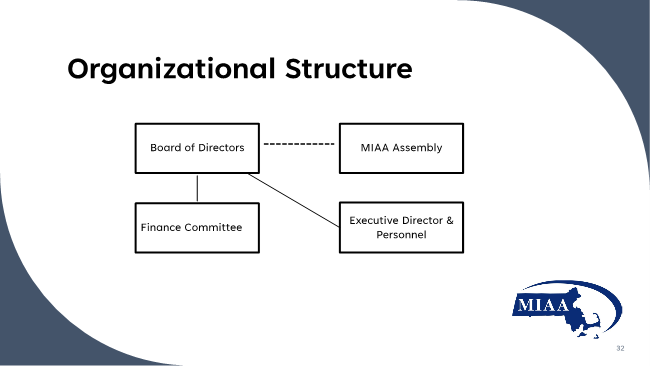In the spring of 2023, the collective voice of the membership unanimously approved a constitutional revision of the organizational structure of the Association in order to provide clarity and consistency to the membership. Clear lines of authority defining the specific powers and duties of the Board of Directors/Finance Committee, Assembly, Executive Director, and the Eligibility Appeals Board were revised and adopted. Consistent application of the approved systems and processes instituted for the greater good of the membership now serve as a road map for moving forward.

Board of Directors
The MIAA's governing body, the Board of Directors, holds significant authority within the association. They interpret the rules relating to interscholastic athletics and enforce penalties for violations. The board ensures that the MIAA's rules and regulations are upheld and followed by all member schools. Composed of elected representatives from the educational organizations, the board's role is to serve as the chief regulatory authority.
In pursuing its purpose, the MIAA aims to foster cooperation and collaboration among various educational organizations, such as the Massachusetts School Administrators' Association (MSAA), the Massachusetts Department of Education (DESE), the Massachusetts Association of School Committees (MASC), Massachusetts Association of School Superintendents (MASS), and the Massachusetts Secondary School Athletic Directors' Association (MSSADA), coaches, game officials, and other professional organizations.
The board is comprised of nine (9) members elected by the MSAA, four (4) elected by MASC, four (4) elected by MASS, and nine (9) elected by MSSADA. The board is comprised of a cross-section of peer colleagues throughout the Commonwealth.
Finance Committee
The Finance Committee shall review the annual budget prepared by the Executive Director and make a recommendation to the Board of Directors for approval. They advise and confer with the Executive Director on fiscal matters and advise the Board of Directors, committees, and members on financial policies and matters. When requested by committee chairs, due to financial matters effecting both the MIAA and the MSAA, and by consent of both Association Finance Committees, joint meetings may be held. For any action to be effective, it must be voted in an affirmative by a majority vote of the then total membership of each Association Finance Committee, determined fourteen (14) days prior to such meeting.
MIAA Assembly
The legislative body of the Association is the Assembly. The Assembly shall consist of the principal or written designee of the principal of each member institution communicated in writing to the President.
The Assembly shall, when called upon, vote upon any proposed rule changes, amendments to the Association’s Constitution or any proposed major action as well as any other matter referred to the Assembly by the Board of Directors.
The Assembly shall elect all members of non-sport standing committees. The term of office of all committees shall begin July 1.
Executive Director & Personnel
The Board of Directors hires the Executive Director and determines the conditions of employment. The Board of Directors evaluates the performance of the Executive Director. The Executive Director’s position is governed by contract and by job description both of which are amendable by the Board of Directors from time to time.
The Executive Director shall be the chief administrative officer of the Association. The Executive Director shall have charge and direction of the day-to-day operation of the Association and shall act at all times in accordance with the established policies of the Association as interpreted by the Board of Directors.
The Executive Director shall keep records of meetings of the Association, of the Board of Directors and those sent him/her by each standing committee; shall oversee dissemination of information to the member schools and the public; shall keep and make available lists of membership in the Association; shall fill staff positions and be responsible for personnel matters; shall issue reports authorized by the Board of Directors; shall attend all meetings of the Board; shall make an annual report; shall serve as secretary of the Board and Assembly; shall keep any other records or make any other reports requested by the Association or by the Board; and shall perform such other duties as the Board may request.
The Executive Director shall have charge of the money of this Association and shall keep records according to a system approved by the Board; shall make payments as directed by the Board or authorized by a coordinator or by a standing committee; shall make an annual report which shall include a financial statement audited previous to the annual meeting as directed by the Board.